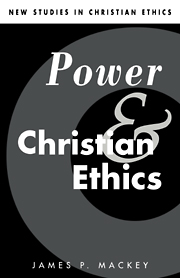Book contents
Conclusion: Of Christian churches and secular states
Published online by Cambridge University Press: 05 November 2011
Summary
How, from the point of view of power and ethics, does the Christian religion relate to political societies, and how should it relate to these? It might be thought that the social sciences would offer a purchase on the kind of material which would best help to answer this question. But this is not the case; partly because one still meets amongst the social scientists too many who are still trapped in the kind of kindergarten materialism which dominated the earlier decades of this century; partly because quantitative research in the social sciences, and especially in political science, so greatly outweighs qualitative research. A recent ESRC seminar on ‘Religion and Scottish politics’ at the University of Edinburgh concentrated almost exclusively on political manifestations, or non-manifestations of sectarian divisions in the south-west of Scotland. Both the conference itself and the kind of research on which it was based illustrated very clearly that it is the kind of programmes which churches or sects push most energetically onto the political agenda that is taken to satisfy the needs of the word ‘religion’ for the social scientists, while the question of the possible religious reaches of political secularism itself in some of its manifestations goes unanalysed. So that the suspicion does emerge that the social sciences still need to measure up to some of their subject matter.
- Type
- Chapter
- Information
- Power and Christian Ethics , pp. 206 - 218Publisher: Cambridge University PressPrint publication year: 1994

